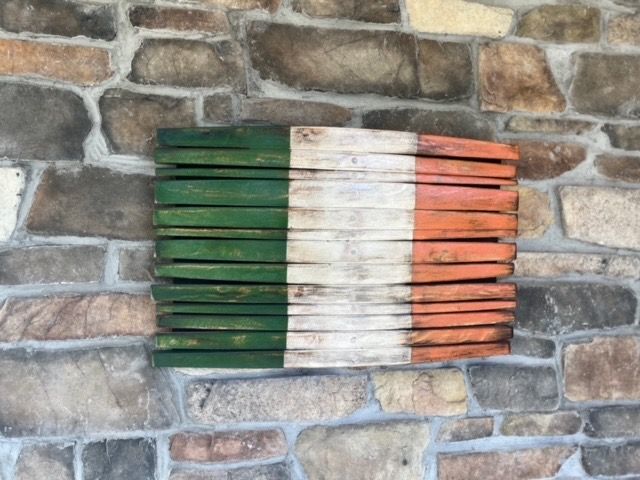[caption id="attachment_80148" align="aligncenter" width="200"] Eleanor McEvoy
By Colleen Taylor
Eleanor McEvoy is a name that needs no introduction.
Since her hit song “Only A Woman’s Heart” exploded on the charts in 1992, McEvoy has been enchanting Ireland and the rest of the world.
No one would contest her status as one of Ireland’s most talented contemporary songwriters.
Eleven albums, forty singles, and covers by stars like Emmylou Harris and Mary Black have put McEvoy and her music in the international spotlight.
But it is the almost supernatural fusion of her voice and lyrics that make her a stand-out star and songsmith.
McEvoy is now taking her latest (and unsurprisingly exquisite) album, “Stuff,” along with her other hit originals, on tour in the United States for a special one-woman show entitled “Alone.”
McEvoy is not your typical songwriter. She approaches the craft in a rather unusual way: without an instrument.
“I write with just a sheet of manuscript paper in front of me,” McEvoy told me.
“I just hear it in my head and write it down. It means that the writing process is silent. It also means that it can be some time after I write a song before I sing and play it.”
While McEvoy admitted that other songwriters find her process a bit “weird,” to me, her method evinces a true, meditative dedication to the words and message of her works.
Which explains the emotional response audiences have to her music.
Her songs have hit on topics imperative for society, and particularly for women, today: she doesn’t shy away from the difficult subject matter, like corruption, poverty, eating disorders.
Rather, she gives voice and tender musical care to those issues. “Only A Woman’s Heart” is but the first, precipitating example of her artistic sensibility.
As she told me, “I find my inspiration in what’s going on in ordinary life, and [what’s] been going on in Ireland in the past ten years…it’s been an extraordinary time to observe the Irish psyche.”
While McEvoy’s musical style wouldn’t place her in the Celtic music section in iTunes, the singer self-identifies as an Irish artist through and through.
“People don’t always see [my Irish subject matter],” McEvoy said with sardonic cheekiness, “because I'm not talking about 'green fields' and 'dowries', and people going 'over the foam'”
Rather, her Irish lyrics are impelled by Irish politics of today: government, church, the Celtic Tiger.
“That’s the Ireland of today, that’s what I’m talking about.”
Because McEvoy feels drawn to represent and treat real, topical issues in her music, it is fitting she wouldn’t obey the commercial trends of the music industry.
Instead, she’s listened to her natural musical interests and instincts.
“I’ve always followed where the muse has taken me,” she said poetically.
McEvoy has been able to wear many hats in her music: from her sophomore and third albums, which were rock in theme, to her album “Snapshots” which involved some hip hop and rap, and her more recent acoustic work in “Stuff.”
McEvoy, indeed, has proved herself a chameleon of genre.
Still, there is one common trait that has always been there in her music: a Celtic stylization and sensibility.
Her heritage presents itself in her melodies, and no matter what she is writing, she sees the base of her music as “intrinsically Celtic.”
Perhaps that is where the magic comes from.
Her current live show, “Alone” puts a modern spin on bardic tradition.
McEvoy takes the stage alone in a single pool of light, accompanied by her electric and acoustic guitars, piano and violin.
She sings, tells stories and even shares her readings of other writers like Chuck Berry and Brian Wilson.
To see Eleanor McEvoy perform live is, I can say from personal experience, to be moved, to be spellbound.
I saw her perform at St. Michan’s Church in Dublin two years ago for the Temple Bar Trad Fest, where she filled the 17th century atriums with magic, emotion, and that Celtic spirit.
When she sang the gorgeous ballad, “Sophie,” there was not a dry eye remaining by the time she hit the last note on the piano.
Ultimately, McEvoy aims for communal catharsis in each show she performs.
“I believe that music is a mood altering substance and by the end of the night, the audience should be uplifted,” she told me.
“That's not to say that I mightn't hit a few darker subjects along the way, but at the end of the night, people should feel exhilarated.”
If you miss songsmith Eleanor McEvoy in New York, you’re missing modern-day magic and, to use her word, exhilaration.
She will be performing “Alone” at the Irish Arts Center in Manhattan on Wednesday, September 30th, and she’ll be at Boston’s The Burren on October 10th.
More information at eleanormcevoy.com.










